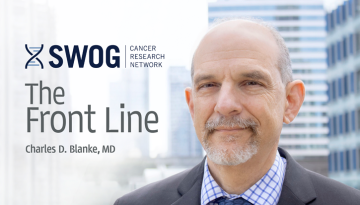Simple post-surgery step significantly reduces bladder cancer recurrence
It's just one step. Flushing the bladder with a common chemotherapy drug after a cancerous tumor is surgically removed reduces the chances of that cancer returning. Canadian and European clinical trials have proven this true and now a major U.S. study has done the same.
Dr. Edward Messing, an investigator with SWOG, the international clinical trials network funded by the National Cancer Institute, has found that an immediate infusion of the common chemotherapy agent gemcitabine after the removal of a bladder cancer tumor will significantly reduce the risk of cancer recurrence. The Winfield W. Scott Professor and Chairman of Urology at the University of Rochester, Messing will present results of this Phase III, blinded clinical trial during a May 15 oral presentation at the annual meeting of the American Urological Association (AUA) held May 12-16 in Boston.
"This one extra step, using a drug that's fairly inexpensive, has impressive results," Messing said. "Urologists in Europe and Canada have been doing this procedure for more than 20 years with other chemotherapy drugs, with the research to prove it. Even the AUA recommends it. Now that we've got results from an American study, using a readily available drug that is very well-tolerated, maybe American urologists will start using gemcitabine this way. I certainly hope this finally changes our standard of care."
Messing is former president of the Society of Urologic Oncology and, in 2013, was awarded the prestigious Presidential Citation from the AUA for his work as a bladder cancer researcher and educator. Messing led a SWOG team that conducted the trial, S0337, which enrolled 406 eligible patients with non-muscle invading bladder cancer. Bladder cancer is the sixth most commonly diagnosed cancer in the United States, and the third most common among men. The low grade, non-muscle invasive form of the disease is common, making up about half of all newly diagnosed cases. Treatment includes a procedure called transurethral resection for bladder tumor, or TURBT, which involves a surgeon removing cancerous tissue from the bladder.
In the Messing study, patients were randomized into two groups. One group, after TURBT, received a single 3.5-ounce instillation of gemcitabine, which was administered directly after surgery and allowed to sit in the bladder for one hour. The drug kills cancer cells, and is often used to treat advanced bladder cancer in combination with the chemotherapy drug cisplatin. The other group of patients, after TURBT, received an infusion of saline only. Both groups were followed for four years. Results were strong and clear: There was a significant 34 percent reduction in risk of recurrence for patients receiving the gemcitabine infusion. While more of those patients experienced moderate post-surgical pain, investigators found, they experienced no other additional side effects, such as bleeding, compared with the patients who received a saline infusion alone.
"The big deal here is that cancer recurrence is common for people diagnosed with this less aggressive form of bladder cancer," Messing said. "I know some patients who undergo four TURBT procedures a year. If we can cut down on these recurrences, we will save a lot of people a lot of pain, money, and time lost to recovery."
Messing said after his AUA presentation, he will submit his findings to a peer-reviewed journal for publication. Messing's SWOG study team includes: Cathy Tangen, DrPH, of Fred Hutchinson Cancer Research Center; Deepak Sahasrabudhe, MD, of University of Rochester; Theresa Koppie of Oregon Health & Science University; David Wood Jr., MD, of Beaumont Health; Philip Mack, PhD, of UC Davis Cancer Center; Robert Svatek, MD, of UT Health San Antonio; Christopher Evans, MD, UC Davis Cancer Center; Khaled Hafez, MD, of University of Michigan; Daniel Culkin, MD, of University of Oklahoma; Timothy Brand, MD, of Madigan Army Medical Center; Lawrence Karsh, MD, of The Urology Center of Colorado; Jeffrey Holzbeierlein, MD, of University of Kansas Cancer Center; Shandra Wilson, MD, of University of Colorado; Guanming Wu, PhD, of Oregon Health & Science University; Melissa Plets, MS, Fred Hutchinson Cancer Research Center; Seth Lerner, MD, Baylor College of Medicine; Nicholas Vogelzang, MD, Comprehensive Cancer Centers of Nevada; and Ian Thompson, Jr., MD, of CHRISTUS Santa Rosa Medical Center.
Research reported in this presentation was supported by the National Cancer Institute of the National Institutes of Health under Award Numbers CA180888 and CA180819. Eli Lilly and Company also supported the work. The content is solely the responsibility of the authors and does not necessarily represent the official views of the National Institutes of Health or Eli Lilly and Company.
Other Recent Stories



